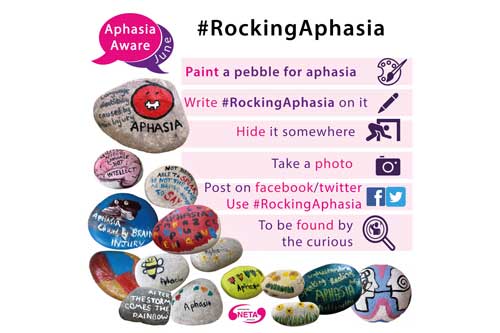Honorary Fellow with the Centre for Human-Computer Interaction Design, Dr Abi Roper, has helped to design the campaign.
By City Press Office (City Press Office), Published
City, University of London has been supporting the #RockingAphasia campaign during the month of June, Aphasia Awareness Month.
Aphasia is a complex language disorder, caused by brain injury such as stroke, cancer or head trauma. Some 350,000 people live with aphasia in the UK.
Primary causes of aphasia include stroke, head injury and brain tumour.
Aphasia is caused by damage to the language centres in the brain. It can affect the ability to understand, talk, read and write.
The #RockingAphasia campaign is a collaboration of members of the Royal College of Speech and Language Therapists (RCSLT), members of aphasia advocacy groups and members of the Stroke Association.
Anyone can join in (no artistic ability required!) by painting ‘#RockingAphasia’ on a pebble, hiding it somewhere, posting a photo of the pebble on Twitter and Facebook and placing the pebble somewhere where it can be found.

Though the condition does not affect intelligence, it is a ‘hidden disability’ affecting personal relationships, accessing services and staying connected.
The North East Trust for Aphasia, is a small charity that provides a space for people living with aphasia to enjoy being together, in a place that understands about aphasia. Their weekly art group decided to paint pebbles for this year’s Aphasia Aware June.
One pebble led to another and Dr Abi Roper (an Honorary Research Fellow at City’s Centre for Human-Computer Interaction Design) and Carly Davey (whose mother lives with aphasia), joined Kathy Cann and the NETA team to create a social media platform across Twitter, Instagram and Facebook using the hashtag #RockingAphasia.

Within the first two weeks pebbles decorated with #RockingAphasia were created across the globe - from Penny Lane in Liverpool to the Kennedy Space station, from Paris to Rome, Greece to Vietnam, South and North America and Australia.
Rocks have been painted by community groups, individuals living with aphasia, their friends and family, speech and language professionals, students and aphasia advocates. Rocks have been found by people who have never heard of aphasia – whilst out running, walking their dog, sitting in the park. These people have looked up the #RockingAphasia and found out more.
Dr Abi Roper said:
I’ve been researching digital accessibility for people with aphasia for several years as part of a multi-disciplinary team of speech and language therapist researchers, human computer interaction researchers and co-designers and collaborators with aphasia. This culminated in an online creative showcase at City, University of London last Summer. Connecting up with Kathy and Carly for this campaign has helped me build on this work and learn from two amazing experts in their domains to capture people’s imagination all over the world. I'm so enjoying seeing how everyone brings their own, unique interpretation to this creative digital adventure to raise awareness of aphasia. No one person’s experience of aphasia is the same. Watching the different voices emerge as the month goes on is a delight! It’s feels a little like the many different versions of aphasia are represented on the many different rocks around the world.
For more information on aphasia please visit this weblink.
For more information on the work of the Royal College of Speech and Language Therapists (RCSLT) please visit this weblink.
